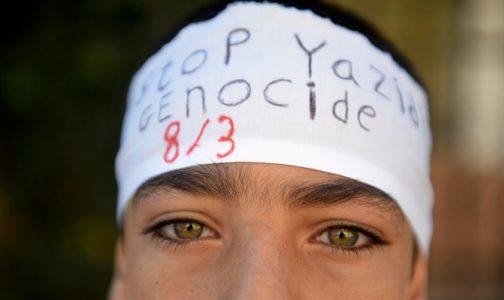
Hundreds of Yazidis killed by ISIS terrorists discovered in mass grave outside Mosul
The remains of more than 340 Yazidi Kurds, likely the victims of ISIS terrorists, have been unearthed in a mass grave outside Mosul, according to the International Business Times.
Iraqi soldiers made the discovery outside of the northern city of Mosul, in the ancient city of Nineveh.
“The mass grave contains the bodies of 340 people and is located in al-Ba’aj town, which was under control of ISIS terrorists,” said Iraqi Brigadier General Mohamed al-Shemari.
The discovery was made as Iraq continued securing the area after its army and allies regained Mosul, the country’s second largest city, and the surrounding region from ISIS in July after eight months of savage fighting.
The grave, containing men, women, and children, is believed to date from 2014 after the Muslim terror group took control of the region in June of that year.
The Yazidis are a religious minority group within the larger Kurdish population. ISIS considers Yazidis to be devil-worshippers, persecuting and killing many adherents during the almost two-year period the terror organization occupied the region.
According to some estimates, almost 10,000 Yazidis were killed or kidnapped during this period, says IBT. A number of mass graves containing Yazidi remains were unearthed in recent months.
The Kurdistan Regional Government in northern Iraq stated that during this purge almost 360,000 Yazidis fled their homes, while another 90,000 left Iraq altogether and took refuge in other countries.
A UN committee of investigation announced that massacres by ISIS against the Yazidi minority were still taking place in Syria, despite a Syrian commitment to deal with the issue.
“Thousands of Yazidi men are missing while thousands of women suffer from harsh violence and rape on a daily basis,” said the organization’s statement, according to a report by Reuters.
Iraqi Prime Minister Haider al-Abadi formally declared victory over ISIS in Mosul on July 10th.
ISIS faced thousands of Iraqi soldiers, Kurdish fighters, Sunni Arab tribesmen, and Shia militiamen, who were backed by US-led coalition warplanes and military advisors who took part in the offensive which began in October 2016.
Iraq and its allies encountered fierce resistance from ISIS, including snipers, suicide bombers, and shelling. When Mosul was finally retaken much of its densely built-up Old City was destroyed as a result of intense fighting.
In 2014, ISIS massacred Yazidis in Sinjar, forcing tens of thousands of them to flee, and capturing thousands of girls and women as spoils of war.
The UN warned that the group appeared to be committing genocide against the Yazidis, but last year a UN Commission of Inquiry (COI) report entitled They came to destroy: ISIS Crimes against the Yazidis, was more conclusive.
Based partly on interviews with survivors, the report found that ISIS “sought to erase the Yazidis through killings, sexual slavery, enslavement, torture and inhuman and degrading treatment.”
The group was holding Yazidis in conditions “that bring about a slow death,” and was transferring Yazidi children from their families to live with ISIS fighters, “cutting them off from beliefs and practices of their own religious community,” the report said.
Source: INN





